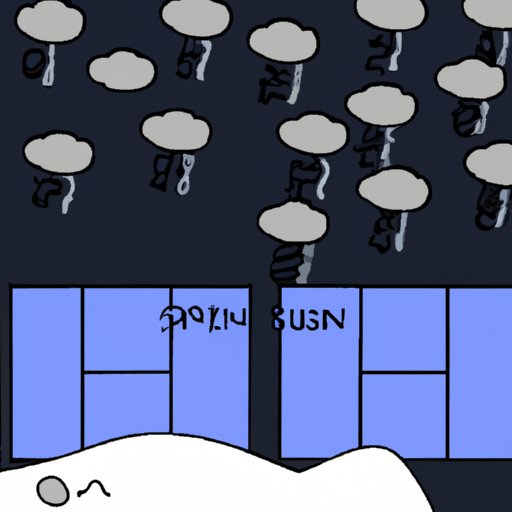
Why Does Rain Make You Sleepy?
Have you ever found yourself feeling extra tired on a rainy day? You’re not alone. Many people experience a feeling of drowsiness and lethargy when the rain starts to pour. In this article, we’ll explore the science behind why rain makes us sleepy, and how we can use this knowledge to improve our sleep habits.
The Science Behind Rainy Day Sleepiness: Exploring the Biology of Why Rain Makes Us Tired
One reason why rain may make us feel sleepy is due to the role of two important hormones: serotonin and melatonin. Serotonin is often referred to as the “happy hormone” because of its role in regulating mood, while melatonin is responsible for regulating sleep. When the body is exposed to less sunlight, such as on a rainy day, the production of serotonin and melatonin can be affected. This disruption can throw off our circadian rhythms and make us feel more tired than usual.
Research studies have shown that a lack of sunlight, or cloudy weather, can disrupt sleep patterns. In one study published in the Journal of Sleep Research, participants who were exposed to less sunlight were found to have lower levels of serotonin and melatonin, leading to disrupted sleep patterns and increased fatigue.
From Melatonin to Mood: Understanding the Psychological Effects of Rain on Our Sleep Habits
Our mood can also be affected by rainy weather, which in turn can lead to feelings of sleepiness. According to experts, rainy weather can cause a decrease in mood due to changes in atmospheric pressure and temperature. This can lead to a decrease in motivation and energy, making it more difficult to stay awake and alert.
Research studies have shown that weather can have a significant impact on mood. A study published in the Journal of Affective Disorders found that rainy weather was associated with an increase in negative moods, such as sadness and tiredness.
The Role of Environment in Sleep: Why the Sound of Rain May Lull You Into a Deeper Slumber
Environment plays an important role in sleep, and the sound of rain can create a calming atmosphere that promotes relaxation and deeper sleep. The sound of rain can help to block out other distracting noises, like traffic or people talking, and create a soothing white noise that can help us fall asleep faster and stay asleep longer.
Other environmental factors, such as temperature and lighting, can also affect sleep. A room that is too hot or too cold can disrupt sleep, as can bright lights or excessive noise. Creating a sleep-friendly environment that is conducive to relaxation and comfort is essential for getting a good night’s rest.
Rain as a Natural Sedative: How Nature’s Soothing Sounds and Scents Can Improve Your Sleep
Natural remedies for sleep, such as rain sound and scent, can have a sedative effect that helps to promote relaxation and deeper sleep. Rain scent, for example, has been found to have a calming effect on the body, reducing stress and anxiety levels.
Research studies have shown that natural sounds and scents can improve sleep quality. A study published in the Journal of Physiological Anthropology found that participants who were exposed to the scent of lavender had improved sleep quality and felt more refreshed upon waking up.
Why Rainy Days Are Perfect for Napping: The Benefits of Embracing Sleep on Dreary Days
When it comes to sleep, it’s important to listen to our bodies and give in to sleep when we need it. Napping on a rainy day can provide a much-needed boost of energy and help us feel more alert and awake.
Research studies have shown that naps can improve productivity and memory, and reduce feelings of fatigue and drowsiness. Taking a short nap during the day can also help to make up for lost sleep at night, and prevent the negative effects of sleep deprivation on the body and mind.
Conclusion
Rainy days can be an ideal time to catch up on some much-needed rest and relaxation. By understanding the science behind why rain makes us sleepy, we can make the most of these dreary days and improve our sleep habits for better overall health and well-being. Don’t be afraid to embrace sleep on a rainy day, and make the most of the natural sedative effects of rain sound and scent to promote deeper rest and rejuvenation.




